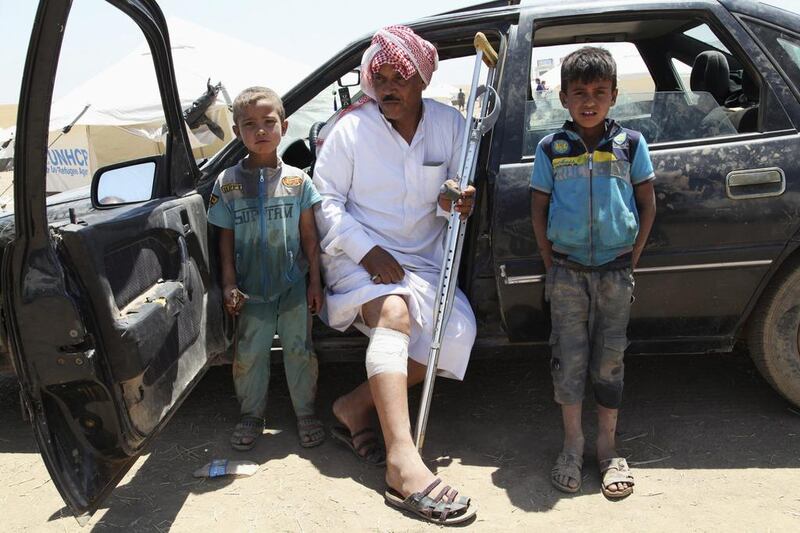KIRKUK // Islamist militants battled for control of a largely Shiite town in north-western Iraq on Monday, sparking fears of more sectarian bloodletting.
Fighters from the Islamic State in Iraq and the Levant (ISIL) waved their black banners and wielded machine guns during their initial entry into Tal Afar.
Fighting continued throughout the day, with conflicting reports on whether the militants or forces loyal to the Iraqi government controlled more of the town.
Local official Abdulal Abbas said Tal Afar was dealing with “martyrs, wounded, chaos and refugees”. Hundreds of thousands are believed to have fled the area.
A city of 200,000, Tal Afar lies close to the border with Syria, from where many of the militants are thought to have entered Iraq in a blitzkrieg assault last week. The militants have captured Mosul, the second largest city, and also Tikrit, Saddam Hussein’s hometown. The lightning campaign took the militants within 100km of Baghdad.
ISIL’s goal is to establish an Islamic state in Syria and Iraq, and eventually, throughout the wider region.
Another ISIL victory in Iraq's north will complicate ongoing military efforts to reverse the group's gains against the government of prime minister Nouri Al Maliki, whose pro-Shiite parties helped stir the Sunni resentment that has fuelled the ISIL-led offensive.
Responding to the militant takeovers with air strikes, the military appears to have stopped the advance on Baghdad, but have struggled to regain captured territory. On Sunday, Iraq’s army claimed to have killed more than 279 of the militants, but the figures could not be verified.
Several countries, including the United States, France, and Australia, have evacuated some of their diplomats from Baghdad due to security concerns. The US said it was reinforcing security at its embassy.
On Monday, another US warship arrived in the Gulf. The USS Mesa Verde is carrying 550 Marines along with a MV-22 Osprey aircraft, which can transport them over a long distance.
“It’s presence in the Gulf adds to that of other US naval ships already there — including the aircraft carrier USS George HW Bush — and provides the commander-in-chief additional options to protect American citizens and interests in Iraq, should he choose to use them,” US Rear Admiral John Kirby said.
If ISIL manages to capture Tal Afar there are fears over what the militants would inflict on Shiite and Turkmen residents. ISIL’s hard-core ideology has led to the group’s brutal killing of non-Sunni Muslims, whom they deem to be apostates, along with soldiers and policemen.
Human rights groups have warned of atrocities and war crimes in the fighting, and unverified images uploaded to the internet that show mass executions by the group will likely further stoke the country's sectarian tensions.
Most of Tal Afar’s security forces fled the area by early morning, according to witnesses. One resident named Al Abadi, who was fleeing the city with his family, said that residents are “gripped by fear and most of them have already left the town for areas held by Kurdish security forces”.
The fighting threatens Iraq's already tenuous unity, with the Kurds taking advantage of the turmoil to extend their control into disputed areas beyond their semi-autonomous zone in the country's north.
That included the capture of Kirkuk, a city technically falling under Baghdad’s remit, but which is claimed by the Kurds as their capital.
Kurdish Pershmerga forces sought to further consolidate control over the weekend, strengthening their grip on the city’s military airport.
The airfield is now flanked by anti-aircraft weaponry and scores of Peshmerga fighters, and city officials have given statements saying that they want to open the facility to both civilian and military traffic — something which they said Baghdad had refused.
“The radars are working, but we don’t have any take-offs or landings at the moment,” said Ayoub Yousef, a Brigadair General of the Peshmerga’s Third-Special Brigade. His forces guard the facility.
He called security “very good”, and suggested that the Kurds would not relinquish either the city or the airport.
“It’s Kurdish now. All of it,” he said.
Also on Monday, the Kurdistan Regional Government said it should receive up to 25 per cent of Iraq’s total oil sales, up from 17 per cent under existing agreements.
Kurdish spokesperson Safeen Dizayee said the total figure should be higher due to the area’s growing population and rising oil output.
hnaylor@thenational.ae
* Additional reporting by Reuters, Agence France-Presse and Associated Press





